The question of whether social media is ruining childhood sparked a lively and thought-provoking debate in class this past week. The “agree” side raised serious concerns about mental health, online safety, disconnection, and the loss of play—highlighting that 40% of a child’s day is now spent on YouTube. On the other hand, the “disagree” side argued that childhood is evolving, and digital spaces can foster connection, creativity, and even learning. While I appreciated their perspective, I believe social media can be harmful to children if it isn’t carefully monitored and guided by adults
Agree
Mike and Kaela, speaking for the “agree” side, raised compelling points about how today’s children are growing up in a world that thrives on external validation—chasing likes, filters, and curated perfection. Phrases like “scrolling away childhood” and “branding themselves before they know who they are” really resonated with me. When I taught developmental psychology, we often discussed identity formation as a key challenge of adolescence.
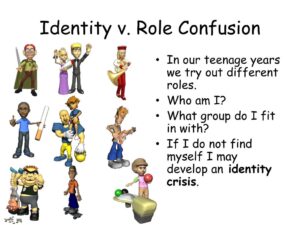 Erikson emphasizes that during this stage, teens begin to ask, “Who am I?” and begin to work to define their sense of self. According to the article, Identity Development: How Living in the Public Sphere of Social Media Damages the Well-Being of Children, constant exposure to idealized online lives and social comparison can disrupt this crucial process. In a 24/7 digital world, teens have fewer chances to self-reflect, explore, make mistakes, and develop an authentic identity. If children are accessing social media even before adolescence, the potential impact on their identity development is deeply concerning.
Erikson emphasizes that during this stage, teens begin to ask, “Who am I?” and begin to work to define their sense of self. According to the article, Identity Development: How Living in the Public Sphere of Social Media Damages the Well-Being of Children, constant exposure to idealized online lives and social comparison can disrupt this crucial process. In a 24/7 digital world, teens have fewer chances to self-reflect, explore, make mistakes, and develop an authentic identity. If children are accessing social media even before adolescence, the potential impact on their identity development is deeply concerning.
This concern becomes even more pressing when we consider how early children are now accessing social media. While most social media networks require users to be at least 13 years old to sigh up, 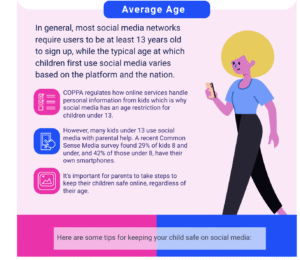 a recent survey found that 29% of kids 8 and under and 42% of those under 8, have their own smartphones.
a recent survey found that 29% of kids 8 and under and 42% of those under 8, have their own smartphones.
Research out of England reveals that by the age of three, 25% of children already have an online presence—often before they can even read or write. By age 17, that number climbs to 80%. How can young people truly discover who they are when their lives are increasingly shaped by online influence 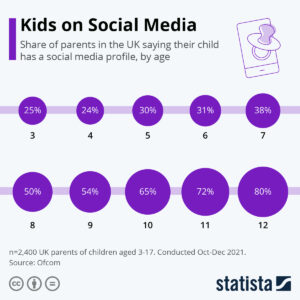 and curated for public consumption? Instead of developing a sense of self through private exploration and personal reflection, many are growing up in a digital environment where their identities are constantly constructed, observed, and evaluated by others.
and curated for public consumption? Instead of developing a sense of self through private exploration and personal reflection, many are growing up in a digital environment where their identities are constantly constructed, observed, and evaluated by others.
Further points made in the debate highlighted how screen time is increasingly replacing real-life interactions, creating a dopamine-driven cycle of disconnection. Jillian offered a valuable neurological perspective, noting that while the brain isn’t fully developed until the mid-twenties, the connection between the emotional and rational parts begins forming around age 10. This raises serious concerns about how social media might interfere with this critical stage of development. From an administrative lens, Rose shared her experience with bullying linked to social media and noted that all school leaders in B.C. are now required to complete Digital Threat Assessment training. Her insight made me realize that we may be underestimating just how deeply social media impacts children and their relationships. As an educator, what concerns me most is that when harmful behavior happens in person, I can step in and support students immediately. But when it takes place behind screens—in private messages or hidden corners of the internet—we lose visibility, and with it, the opportunity to intervene before real harm is done.
Disagree
On the other side, Carol and Nofisat offered a very interesting perspective on how social media is not the problem. They challenge 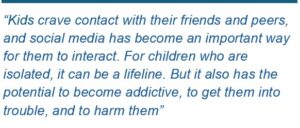 idea that being online automatically means being disconnected, emphasizing that digital spaces can support real relationships and social growth. As Carol pointed out, just because previous generations
idea that being online automatically means being disconnected, emphasizing that digital spaces can support real relationships and social growth. As Carol pointed out, just because previous generations didn’t grow up with social media doesn’t mean it is inherently harmful—it’s just different. Jillian shared how her own children use social media to connect with others in meaningful ways, showing that technology can build, not break, relationships. This side posed an important question: is social media the problem, or is it how we’re using it? They described digital spaces as the “new playgrounds” and social media as the “new sandbox,” suggesting that childhood is not being ruined—it is simply changing.
didn’t grow up with social media doesn’t mean it is inherently harmful—it’s just different. Jillian shared how her own children use social media to connect with others in meaningful ways, showing that technology can build, not break, relationships. This side posed an important question: is social media the problem, or is it how we’re using it? They described digital spaces as the “new playgrounds” and social media as the “new sandbox,” suggesting that childhood is not being ruined—it is simply changing.
My Final Takeaway….
Technology is here to stay, and as parents and educators, we need to be aware of the good, the bad, and the ugly that come with it—especially when it comes to social media. There is no one “right” answer for when a child should get a phone or access social media. According to the article When Are Kids Ready for Social Media?, parents face immense pressure to allow access, and one of their biggest challenges is deciding not just when their child is ready, but also how much access is appropriate. Children often start asking to join social media in late elementary or early middle school, and parents feel pressure to let them in so they don’t feel excluded. If parents can delay social media access until their child is more emotionally mature, it can help them better resist addictive features and reduce the risk of online harm. Max Stossel, CEO of Social Awakening, notes that after speaking with thousands of parents, none have said they wished they had given access sooner—many are instead grateful they waited.
Deciding when to give kids access to phones and social media is anything but easy. It’s one thing for me to say now, “If I had young children, they would not be allowed on social media”—but I recognize that it is easier said than done. I have been there. When my three kids were younger, I remember wrestling with the decision of when they should get a phone or join social media platforms. What stands out most is how quickly the digital landscape evolved. The decisions I made for my oldest were very different from those I faced with my youngest, largely due to increasing pressure and shifting norms. What I have learned is that it is a parent’s responsibility to set clear guidelines around phone and social media use. Staying involved, teaching digital responsibility, and keeping open communication are key to helping kids navigate the digital world safely.

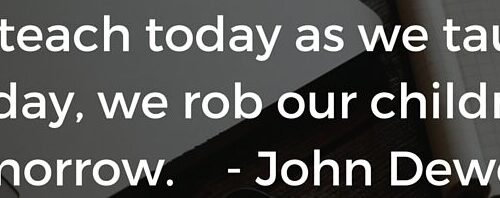
6 Comments
Brianne McFetridge
While I can agree that technology is here to stay, I cannot agree that kids should have full access. It is startling that 25% of kids have an online presence by age three! Looking back, I know that I posted pictures of my children when they were babies without considering a digital footprint. Now that they are older, deciding when they are ready for social media was a big step! It has required a lot of navigating and conversation to ensure they are safe online. In the end, it is a reshaping of childhood.
Kritika Sehgal
Hi Leanne,
Reading your blog honestly made me pause and think deeply. As a teacher, I see the same struggles you mentioned—students who are shaped more by online approval than by their own interests or creativity. The phrase you used, “branding themselves before they know who they are,” really hit me. It’s so true and so sad at the same time.
I also found your points about identity development very relevant. In my classroom, I often see students distracted or emotionally affected by what’s happening online, even during school hours. It’s tough, because the harm isn’t always visible or easy to address. Like you said, much of it happens in private messages or behind screens.
At the same time, I also hear students talk about how they connect with friends or express themselves online. So I get where the disagree side is coming from too. But like you, I believe it all comes down to guidance and timing. The example you gave about different decisions with your own kids as the digital world changed—that really shows how hard and personal this issue is.
I must say I am way too impressed of your honest writing. Yes definitely, while we can’t stop the digital world from growing, we can stay involved and guide students toward using it safely and meaningfully.
Kritika
Kaela
Hi Leanne,
Thank you for this incredibly reflective post. You captured so many of the tensions we all feel as educators and parents navigating kids’ relationship with social media. Like you, I was really struck by how platforms push kids to seek external validation before they’ve even had a chance to form their own sense of self. That Matthew McConaughey quote—“What do you think of me?” vs. “Who do I want to be?”—hit hard for me too.
In our presentation, Mike and I wanted to move beyond fear and focus on the intentional design of these platforms—their addictive qualities, the comparison traps, and how they disrupt natural identity development. I agree with you that even the most present parenting can’t fully compete with the influence of these apps.
That said, I appreciated the nuance that Carol and Nofisat brought to the conversation. Like you, I think the real takeaway is that this isn’t black and white. Social media isn’t going away—and while it can support connection, it requires boundaries, maturity, and guidance. As a mom to young kids and a teacher of K–8 students, I see firsthand how much scaffolding is needed before kids are ready to be online.
Your reminder that there’s no one-size-fits-all answer really resonated. What matters most is that we stay involved, stay informed, and lead with intention.
– Kaela
Jenna Reimer-Jones
Hi Leanne,
One particularly notable point you made is that teens have fewer opportunities to make mistakes in the digital world. This stands out because, regardless of whether a teenager is personally active on social media, others may still record or share unflattering content involving them. Thus, even parental restrictions on direct social media usage do not guarantee full avoidance of its influence. The decision regarding the appropriate time to allow children access to social media is understandably complex. It is crucial for parents to remain engaged and maintain open lines of communication with their children about online interactions. I do have concerns about youth who lack consistent adult guidance, as they may face greater challenges in navigating the potential risks associated with social media engagement.
Jenna
Nofisat
Hi Leanne,
Thank you for this very balanced and nuanced post. I am impressed with the way that you were able to articulate both sides. The recognition that social media may not necessarily be detrimental, but rather may be used in positive or negative ways and therefore require supervision and guidance is important. Your presentation of Erikson’s theory of identity formation in tandem with this argument is also insightful and clever. Children are indeed trying to find their own identities in a world in which they are surveilled and “liked” constantly, which can have a very distorting effect on their self-image. Truly I also believe that adult interventions and sanctions in online spaces do not always function as they do in physical playgrounds.
I maintain my belief that social media functions as “the new playground” because this idea suggests the real issue lies in how children receive guidance to use these platforms properly. Thoughtful parenting alongside delayed access and digital literacy education stands out as the central message of your concluding remarks.
Nofisat
Jenni Peeke
Great read, Leanne 🙂
You’re totally right, there is no right answer when it comes to social media and children (or anyone for that matter). I don’t have children myself, but I do think that a lot should come from parent modeling appropriate use of social media in front of their children. As adults we can hopefully have a little more self control, but we also should be mindful of our use in front of kids and model best practice for them.
I know that personally I need to stay away from social media to protect my own mental health as an adult with access to therapy and a lot of self-confidence… so I can’t imagine how it impacts our most vulnerable students.